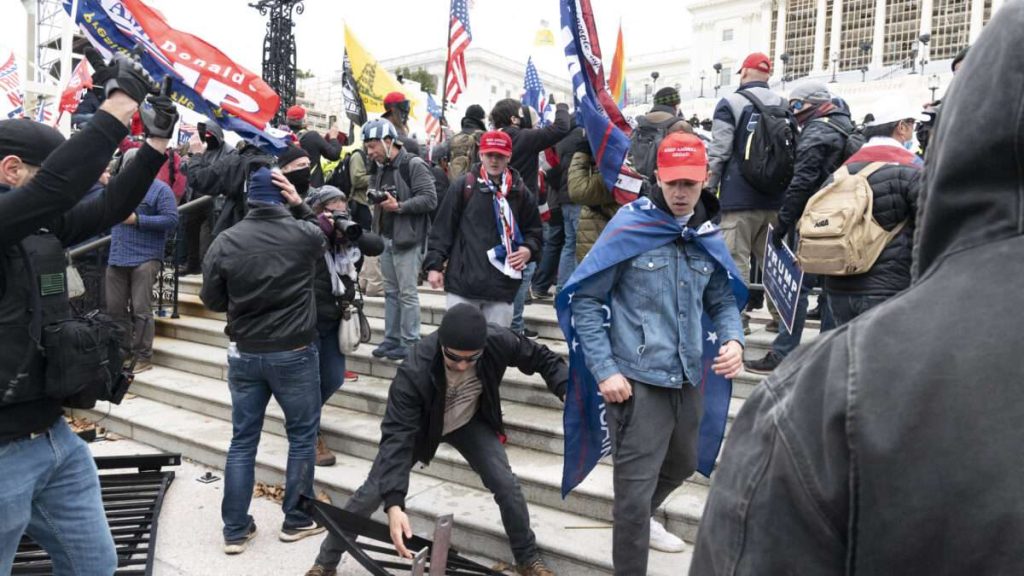The problem with convicting members of the “western chauvinist” Proud Boys on seditious conspiracy charges is that it wrongly elevates a violent tantrum by a bunch of thugs to the level of an insurrection, and it lets officials who prosecute them puff themselves up as saviors of the republic. Worse, the case took liberties with a statute that is probably best forgotten to arrive at its conclusion when normal criminal law could have punished rioters without putting the criminal justice system through contortions.
Prosecutors High on Their Own Supply
“A jury in the District of Columbia today returned guilty verdicts on multiple felonies against five members of the Proud Boys, finding four of the defendants guilty of seditious conspiracy for their actions before and during the breach of the U.S. Capitol on Jan. 6, 2021,” the Department of Justice trumpeted last week. “According to the evidence at trial, in the months leading up to Jan. 6, the defendants plotted to oppose by force the lawful transfer of presidential power, and to prevent the Members of Congress, and the federal law enforcement officers who protect them, from discharging their duties.”
“At my Senate confirmation hearing just over a month after January 6th, I promised that the Justice Department would do everything in its power to hold accountable those responsible for the heinous attack that sought to disrupt a cornerstone of our democracy: the peaceful transfer of power to a newly elected government,” huffed Attorney General Merrick Garland, a man who gives every impression that he tremendously enjoys the smell of his own emissions. “Today’s verdict is another example of our steadfast commitment to keeping those promises.”
And so, we’re told, the republic is safe from those who would rise against it in insurrection. But before we consign former Proud Boys leader Enrique Tarrio and codefendants Ethan Nordean, Joseph Biggs, and Zachary Rehl to the history books alongside Mosby and Quantrill, Confederate guerrillas of the sort who inspired the seditious conspiracy statute to begin with, let’s consider an important obstacle: There’s sparse evidence of a meaningful conspiracy “to overthrow, put down, or to destroy by force the Government of the United States” as required by law.
Shouldn’t a Conspiracy Be Better Organized?
“The FBI has found scant evidence that the Jan. 6 attack on the U.S. Capitol was the result of an organized plot to overturn the presidential election result,” Reuters noted in August 2021. “‘Ninety to ninety-five percent of these are one-off cases,’ said a former senior law enforcement official with knowledge of the investigation. ‘Then you have five percent, maybe, of these militia groups that were more closely organized. But there was no grand scheme with Roger Stone and Alex Jones and all of these people to storm the Capitol and take hostages.'”
That said, if anybody was among those “more closely organized,” it was the Proud Boys, and the Oath Keepers of the earlier case. But still, prosecutors and the judge had to get creative to arrive at a verdict.
“The sedition trial…was characterized by frequent delays, frayed relations between the defense and prosecution and several decisions by the presiding judge, Timothy J. Kelly, that tested the boundaries of conspiracy law,” reported Alan Feuer and Zach Montague for The New York Times. “Judge Kelly’s rulings allowed prosecutors to introduce damning evidence about the violent behavior and aggressive language of members of the Proud Boys who had only limited connections to the five defendants. The rulings also permitted jurors to convict on conspiracy even if they found there was no plan to disrupt the certification of the election, but merely an unspoken agreement to do so.”
“Mr. Tarrio was not even in Washington on Jan. 6, having been kicked out of the city days earlier by a local judge presiding over a separate criminal matter,” they added.
“The Justice Department’s take, of course, fits the narrative favored by Democrats who reflexively describe the Capitol riot as an ‘insurrection.'” Reason‘s Jacob Sullum observed. “But that term implies a level of planning and organization that does not fit the chaotic reality of what happened that day.”
There’s no easy way to portray the resulting conviction as anything other than a stretch. In fact, less-loaded criminal charges could and did serve to penalize the defendants for their disruptive actions in Washington, D.C., on January 6.
Normal Criminal Charges Would Have Done the Trick
“The four defendants and co-defendant Dominic Pezzola, 45, of Rochester, New York, were also found guilty of obstruction of an official proceeding, conspiracy to prevent Members of Congress and federal law enforcement officers from discharging their duties, civil disorder, and destruction of government property,” the Justice Department added in its press release. “Pezzola was also found guilty of assaulting, resisting, or impeding certain officers and robbery involving government property.”
These are charges grounded in the defendants’ own conduct. They don’t require an “unspoken agreement” or “limited connections” to other people that can tendentiously be converted into a plot against the republic if you squint just right and have a cooperative judge. But destruction of property, impeding Congress, and assaulting police officers, while crimes, don’t allow prosecutors and their political allies to portray themselves in heroic terms. Rioters are violent troublemakers, but seditious conspirators can be portrayed as part of a larger movement that intends harm to the whole country.
When Seditious Conspiracy Was “Paranoid and Dictatorial”
The Trump administration floated pulling this same stunt with seditious conspiracy charges (often incorrectly framed as just “sedition”) against rioters during the civil unrest of the summer of 2020.
“Attorney General William Barr told the nation’s federal prosecutors to be aggressive when charging violent demonstrators with crimes, including potentially prosecuting them for plotting to overthrow the U.S. government,” The Wall Street Journal‘s Aruna Viswanatha and Sadie Gurman reported at the time.
“Sedition charges require proof of efforts to overthrow the United States Government,” Harvard Law’s Laurence Tribe responded. “Talking in these terms based on what’s happening is grotesquely irresponsible. It’s way beyond monarchical. It’s paranoid and dictatorial. Opus Dei, anyone?”
Likewise, the ACLU called Barr’s proposed seditious conspiracy prosecutions “a tyrannical and un-American attempt to suppress our demands for racial justice and an end to police violence.”
Now the shoe is on the other foot, with a new administration wielding seditious conspiracy charges as weapons against another set of rioters with a different flavor of politics. Again, the rioters’ actions would justify prosaic criminal prosecutions if their partisan loyalties weren’t at odds with those in power. But why just punish political opponents for bad behavior when you can smear them and their associates as dangers to the nation?
In a country as divided as ours, everything becomes a bludgeon against hated others. Politics ruin everything, including the criminal justice system.
The post Punishing Rioters Is Wise. Bogus ‘Seditious Conspiracy’ Charges Are Not. appeared first on Reason.com.






